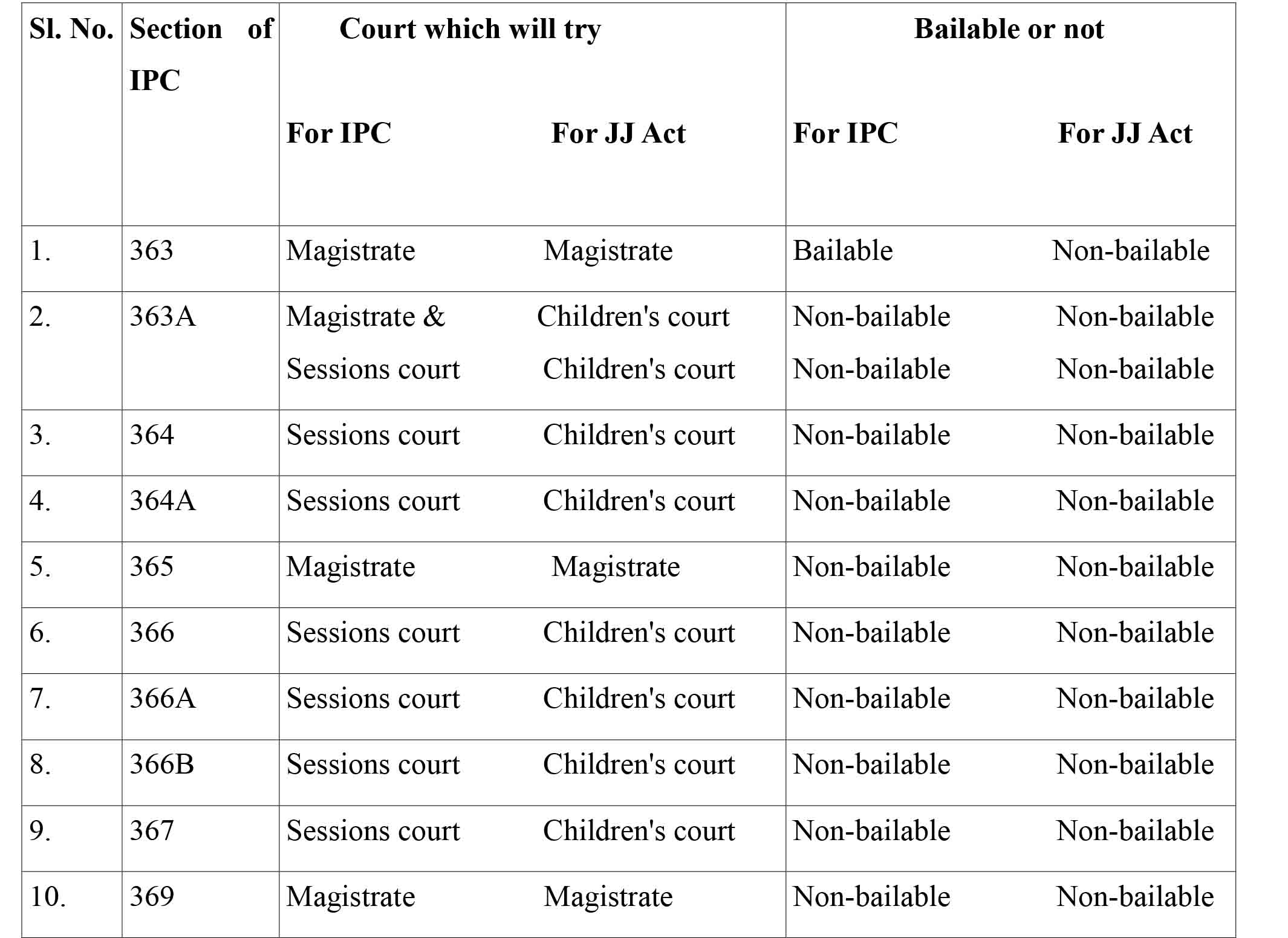Kidnapping Of Child A Bailable Offence Under IPC Becomes Non-Bailable Under JJ Act: A Discussion By Rakesh Kumar Singh
Rakesh Kumar Singh
24 April 2017 5:16 PM IST

In the present paper, we will discuss the effect of newly enacted Juvenile Justice (Care and Protection of Children) Act, 2015 vis a vis offences related to kidnapping and abduction as envisaged in IPC, 1860. We know that kidnapping of a child below certain age (different for male & female) from lawful guardian is an offence punishable upto 7 years imprisonment but is a bailable offence. Prime issue herein is whether the enactment of new JJ Act which covers every persons under 18 years of age irrespective of gender affects the nature of offence of kidnapping. A purposive reading of JJ Act will go to show that it really affects the kidnapping provisions of IPC on crucial aspects.
- There are some provisions of JJ Act such as Section-84, 85, 86 which need consideration. Section-84 deals with kidnapping of child and reads as under:
“For the purposes of this Act, the provisions of sections 359 to 369 of the Indian Penal Code, shall mutatis mutandis apply to a child or a minor who is under the age of eighteen years and all the provisions shall be construed accordingly”.
- The issue is whether the section only refers to the provisions of IPC related to kidnapping or in reality creates an offence. We have to bear in mind that JJ Act is not an amending law and also it nowhere claims that it has been enacted with one of the purposes of amending any law. Therefore there cannot be any doubt that Section-84 does not want to amend the kidnapping provisions of IPC. Section-361 and 363A provide for different standards for offences in respect of male and female and apply to male upto 16 years and female upto 18 years. Meaning thereby that if a male of 17 years of age is removed from lawful guardian, the act shall not be treated as kidnapping. On the other hand, Section-84 of JJ Act is gender neutral and removal of 17 years old male from lawful gardian will also fall under Section-84. We have already accepted that Section-84 of JJ Act does not amend the IPC. Therefore, it can be said that by virtue of Section-84, differentiation between male and female as made in IPC does not get obliterated.
- In Section-84 of JJ Act, following expressions need serious consideration:
- For the purposes of this Act;
- Shall mutatis mutandis apply;
- All the provisions shall be construed accordingly.
- No one will doubt that one of the purposes of the JJ Act is to punish a wrongdoer whose activity has in some manner adversely affected a person under 18 years of age. This purpose is easily supported by the fact that JJ Act itself a full chapter for offences and penalties. Kidnapping and abduction of any person either simplicitor or for any other purpose will without any doubt adversely affect that person and therefore it that person is under the age of 18 years, the JJ Act may contemplate a punishing provision.
- Now, for punishing such activites, the JJ Act instead of kidnapping and abduction or its various form or purpose has chosen to adopt the already defined scenario available in IPC and therefore has referred to Section-359 to 369 IPC indicating that those provisions shall mutatis mutandis apply. What the Section-84 has done is to enact a provision through referential legislation. We know that there are two types of referential legislation i.e. by reference and by incorporation. Section-84 may be of either type but for the present purpose type itself is immaterial. Type becomes material when in a subsequent time period the referred legislation undergoes an amendment and a question arises as to whether the amendment should be read in the law which has adopted the path of referential legislation. Both types give different results in such situation. We are presently not required to deal with any such situation and therefore we will not discuss the differential concept of two types aforesaid and will leave that topic for some other paper.
- The third expression “all the provisions shall be construed accordingly” may give an impression that it amends the provisions of IPC. But the impression is superficial. This phrase comes only after the fact that the provisions of IPC have been applied to persons under 18 years of age and for the purposes of JJ Act. Once it is done, those provisions of IPC will be construed accordingly. Clearly, only while reading the JJ Act, those provisions need to be construed accordingly and not while reading the IPC independently.
- The marginal note of the Section-84 says that it relates to Kidnapping and abduction of child. The aforesaid provision falls within the Chapter- IX titled as other offences against children. As such, we have to accept that Section-84 creates specific offence.
- Once we accept that Section-84 of JJ Act creates new offences relating to kidnapping and abduction of a person under 18 years of age irrespective of gender, we may proceed further to note the nature of offences. Offences are classified in section-86 which reads as under:
“86. (1) Where an offence under this Act is punishable with imprisonment for a term more than seven years, then, such offence shall be cognizable, non-bailable and triable by a Children’s Court.
(2) Where an offence under this Act is punishable with imprisonment for a term of three years and above, but not more than seven years, then, such offence shall be cognizable, non-bailable and triable by a Magistrate of First Class.
(3) Where an offence, under this Act, is punishable with imprisonment for less than three years or with fine only, then, such offence shall be non-cognizable, bailable and triable by any Magistrate”.
- Apparently, the aforesaid is based upon the part-2 of the first schedule appended to CrPC. It makes classification on the basis of imprisonment and first category is less than 3 years, second category is 3years and upto 7 years and third category is more than 7 years. Now, due to Section-84 and 86, kidnapping and abduction of a person under 18 years of age will be governed as under:

- At this stage, another provision of JJ Act needs to be noted. It is Section-85 and it reads as under:
“85. Whoever commits any of the offences referred to in this Chapter on any child who is disabled as so certified by a medical practitioner, then, such person shall be liable to twice the penalty provided for such offence. Explanation.- For the purposes of this Act, the term “disability” shall have the same meaning as assigned to it under clause (i) of section 2 of the Persons with Disabilities(Equal Opportunities, Protection of Rights and Full Participation) Act, 1995”.
- Certainly, in case of a disabled child, punishment is twice the normal quantum. It will definitely create some changes. Be it noted that IPC does not have any prescription. If we see the aforesaid table, we will find that so far the nature of offences is concerned, all the aforesaid offences are non-bailable for the purposes of JJ Act. Therefore, there will be no change in respect of a disabled child. However, there are three offences i.e. 363, 365 & 369 which are triable by a Magistrate. Now, in respect of a disabled child, the offences under Section-363, 365 & 369 will become punishable upto 14 years (twice the general quantum). In terms of Section-86 of JJ Act, all offences punishable for more than 7 years imprisonment are to be tried by a Children's Court. As such, if the offence described under any of the sections i.e. 363, 365 & 369 of IPC is in respect of a disabled person under the age of 18 years, the same will be a non-bailable offence and will be triable by a Children's Court.
- In the present context, Section-369 IPC would be an interesting read. It goes as under:
“Kidnapping or abducting child under ten years with intent to steal from its person.-Whoever kidnaps or abducts any child under the age of ten years with the intention of taking dishonestly any movable property from the person of such child, shall be punished with imprisonment of either description for a term which may extend to seven years, and shall also be liable to fine”.
- Now, if we apply Section-84 JJ Act to the aforesaid, we will find that Section-369 is to apply to any child or minor under 18 years of age and for the purposes of JJ Act, Section-369 has to be construed accordingly. As such, instead of 10 years, Section-369 has to be construed as if it applies to every person under 18 years of age. The section being already indicated as non-bailable and triable by Magistrate, the same does not contradict the classification of Section-86.
- The aforesaid analysis shows that the JJ Act has significantly improved the provisions of IPC related to kidnapping and abduction through referential legislation in following manner:
- Irrespective of gender, if any person under 18 years of age is kidnapped from lawful guardian, the act will be punishable whereas for IPC, the act is not punishable if done against a male of more than 16 years of age;
- The kidnapping aforesaid becomes non-bailable whereas it is bailable under IPC;
- Kidnapping of a person under 18 years of age for begging becomes triable by a Children's Court whereas in IPC, the same is triable by a Magistrate;
- If such person is disabled, the act will be punishable with twice the normal quantum;
- In case of disabled child under 18 years of age, the act aforesaid becomes triable by a Children's Court whereas in IPC there is no such differentiation on the ground of disability;
- Kidnapping/abduction with intention to steal from person shall be punishable even in respect of a child under 18 years of age whereas the IPC only covers a child upto 10 years.


